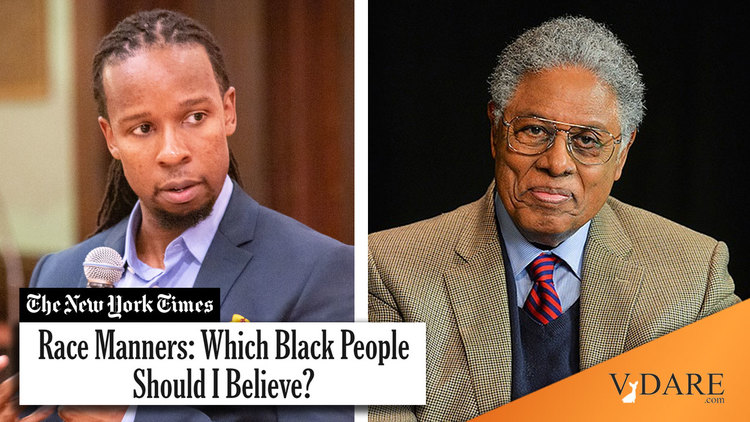


By Steve Sailer
06/29/2021
A. Yes, if they are Republicans!
From The New York Times opinion section:
Race Manners: Which Black People Should I Believe?
June 28, 2021By Jenée Desmond-Harris
Ms. Desmond-Harris is a contributing Opinion writer.
Race Manners is a monthly advice column that helps readers resolve personal dilemmas involving race, culture and identity.
Q. One of the most common pieces of advice I’ve heard given to aspiring white allies is to seek out more Black opinions. This advice is often coupled with a further admonition to suspend one’s own judgment and simply defer to Black people on matters of race and racism. However, Black Americans are a diverse group with a wide range of opinions on matters related to race and racism. As a result I have seen this advice result in paralysis of judgment and also the elevation of some bad ideas that come from the “right” people. If we asked Kimberlé Crenshaw, Adolph Reed, John McWhorter, Angela Davis and Tim Scott all to weigh in on “defund the police,” we’d get five different answers. What advice do you have for prospective and aspiring white allies about evaluating media from diverse sources and ultimately drawing their own conclusions?
A. I couldn’t have asked for a more appropriate question to answer in the first installment of an advice column about race. …
For what it’s worth, the fact that you care at all — that you value what Black people have to say and that you take seriously the idea of listening — puts you ahead of plenty of Americans who wholly disregard what Black people experience or simply want the worst for us. So, in my opinion, you’re on the right track. …
Should you weigh the perspectives of people who are personally affected by racist policies? Of course. But you don’t have to weigh them all equally. Gather information and learn, yes, but as you’re digesting all those tweets and articles and interviews, ask yourself questions like these: Do I generally consider this person or media outlet to be smart and trustworthy? Do I see eye to eye with this person or media outlet on issues about which I feel more clear and confident? Does what I’m hearing line up with my values?
So, if you generally love Senator Scott’s worldview and believe he’s a brilliant thinker on issues that feel more straightforward to you — climate change, voting rights, abortion — then maybe he’s your guy and you should give his opinion a lot of weight. If it feels as if you’re operating from a completely different set of values, then perhaps you don’t need to take your cues from what the senator thinks about defunding the police any more than you care about what he thinks about tax policy. If your impression of a particular writer is that he or she has a history of a being a blowhard who’s writing outside his or her expertise, feel free to take that person’s point of view with a grain of salt. While all Black people obviously have experience with racism, that’s not the same thing as having studied, say, school integration, and having studied school integration won’t make someone an expert on microaggressions. So go to the people with expertise.
Ibram X. Kendi is a credentialed expert. What kind of degree does Thomas Sowell have?
Also, remember that the public conversations you’re hearing are often shaped by power dynamics in the media. So there’s a lot of money to be made and fame to be had for Black people who are willing to be anti-Black scolds, giving voice to the racist views of the white people who offer them platforms. Keep in mind that the people who work in media have incentives as well as personal agendas that can inform which Black people they choose to elevate.
In contrast, do you realize how little The New York Times pays for opeds about white people touching my hair?
Rather than treating all opinions as equally worthy and getting stuck, you can take a look at the available data.
But don’t get carried away and start looking at crime or test score data.
Your instinct to trust a group to advocate for themselves is right, so you should consider what most members of that group say they want. For example, a large majority of Black people are in favor of reparations, so it might make sense to defer to them. The question of police reform is a little trickier. Outside of the wide consensus that it’s needed, there are varying views on how to get there, and the idea of defunding the police is an emerging policy proposal, not a divide based on decades of political difference. So that’s where you need to do your research and decide what you think is effective policy to reach a shared goal of a less racist country.
You should approach this question and others that relate to race and racism with the same rigor that you apply to everything else. Give these issues the same intellectual energy. Take the same responsibility. What if all the people from all backgrounds had sat at home last summer, refusing to protest police abuse of Black people, until Adolph Reed and Kimberlé Crenshaw issued a joint statement about what should happen? There would have been no protests. There’s a fine line between being curious about and respectful of what others think and being lazy and cowardly, and you don’t want to be on the wrong side of it.